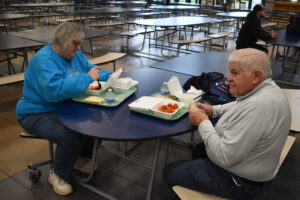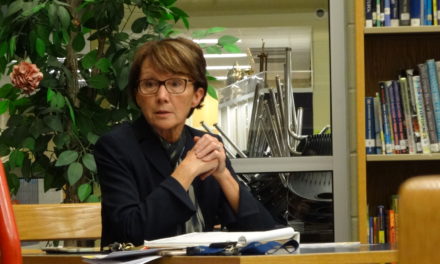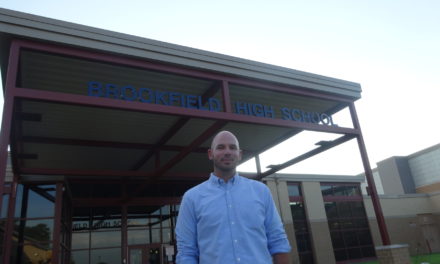
Fran and Wayne Tanner enjoy a pasta dinner at a fundraiser for Brookfield’s school lunch debt. “We always support the schools,” Mrs. Tanner said.
Brookfield Local School District held a fundraiser April 29 to help pay down the debt some students owe to the cafeteria fund, and the publicity about the fundraiser prompted people to make outright donations to the campaign.
District Treasurer Jordan Weber said the effort was “a good start” but is only part of what is needed to get a handle on the debt, which stands at about $22,000. About $1,300 had been raised through the dinner and donations from publicity surrounding the dinner — Sereday Trucking donated $500 — as of May 17.
“The long term, the next-best alternative is really the push to get everyone who can apply, might be able to get benefits, to get on them,” he said of applying for free or reduced-price lunches.
“It’s not a complicated form, but it’s not the easiest form in the world,” Weber said. “You don’t have to be completely destitute to be able to get free and reduced lunch.”
Student debt from before a student is accepted into the free or reduced-price lunch program is not wiped out, but it keeps the debt from climbing. And, it’s the responsibility of parents and guardians, not the kids, to apply, even though it is a student’s name that is associated with the debt.
“The kid is stuck in the middle,” Weber said. “The kid can’t apply for their own benefits, unless they’re their own guardian. We can’t apply for people, and we can’t force the parent to apply. We just try to do everything we can to get them to apply.”
Food service Supervisor Gabby Garrett noted parents can fill out a form if their financial situations change during the school year.
“They can fill out as many applications as they’d like throughout the year,” she said.
The debt has ballooned this year because of several factors, most notably the end of free lunches for all students, which the federal government had instituted during the COVID-19 pandemic, and “economic factors,” Weber said.
“So many families came back from being free, especially if you have two, three kids, and all of a sudden now you gotta go back to paying,” Weber said. “This is the same time inflation’s rampant, so economic conditions haven’t changed that much.”
He also noted that “It really isn’t just our school. It is everywhere.”
Some schools are strict with lunch debt, limiting a student’s access to extracurricular activities or other school activities, Weber said. Brookfield’s policy is to give a student a lunch, even if they owe money. They are limited in the extras they can buy, however, Weber said.
The U.S. Department of Agriculture controls how cafeteria money is collected and spent, Weber said. The school does not contribute general fund money unless the cafeteria fund cannot pay its bills.
Because of USDA regulations, a school cannot unilaterally give students a free lunch, and the USDA also controls how much a district can raise prices, Weber said. There is an effort to get the state to pay for free lunches, he said.
“A lot of members of the public won’t quite understand, well, if you’re a school and you can afford X, Y and Z, why can’t these kids eat for free? There are strict regulations, because it’s run by the USDA. Unfortunately, it doesn’t work that way. If it did, then it would be a lot simpler.”
With the money raised from the fundraiser and donations, it most likely will be applied to uncollectable debt from students and staff members who are no longer at the school, Weber said.
“From there, you have to do it in a very methodical and meticulous way of what is the way that does not discriminate,” he said, noting that paying off the debt of one group of students, such as those who are now on the free-lunch program, discriminates against other students.
The publicity over the fundraiser attracted a lot of negative comments, especially on social media. Weber said he does not blame people for feeling that way.
“School funding is the closest someone’s tax dollars stays to them,” he said. “I’m not unsympathetic to the fact that this is usually the thing they are most concerned about, even if they don’t have kids that go to school.”
@@@
Brookfield Board of Education has approved a one-year contract with Cafeteria Supervisor Donna Bailey, but it’s unclear what that will mean for the school’s food service program.
Bailey has been on unpaid Family and Medical Act leave since May 2022, and Nutrition Inc. has been providing cafeteria supervision for this school year.
“I don’t want to speak as to what Ms. Bailey’s intentions are, but if she would return, the board has to decide on Nutrition group’s contract moving forward,” school Supt. Toby Gibson said April 18. “Potentially, she could be working in cooperation” with Nutrition Inc.
Nutrition Inc. was rehired on a one-year contract May 17 at a cost to the district $1,625 a month, said district Treasurer Jordan Weber.
Board member Jerry Necastro voted against bringing back Bailey but said he would not discuss his reason because it is a personnel issue.
Bailey’s contract begins July 1, and she will be paid $45,334.









